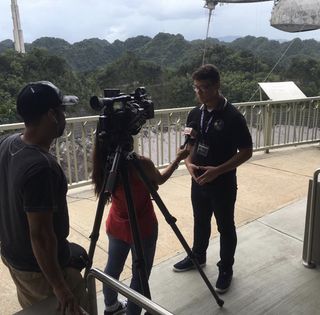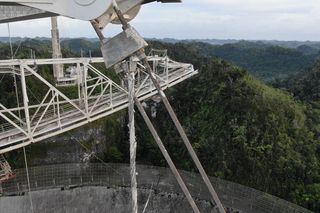Arecibo observatory supporters ask White House to help save damaged radio telescope
"This might seem like a disaster, but I think we can transform it into an opportunity to make the Arecibo Observatory a better institution," one of the movement's organizers said.

The fate of astronomy in Puerto Rico is uncertain after two failed cables undermined the structural stability of Arecibo Observatory's iconic radio telescope, but advocates hope to ensure the facility continues to lead the island toward the stars.
Arecibo supporters have created a formal White House petition calling on the federal government to reassess the situation at the observatory in hopes of rescuing the damaged telescope. Such action would counter an announcement from the U.S. National Science Foundation (NSF), which owns the observatory, that it will decommission the 1,000-foot-wide (305 meters) dish and the heavy platform suspended above it to hold scientific equipment.
Arecibo supporters have launched White House petition asking the federal government to intervene.
"This might seem like a disaster, but I think we can transform it into an opportunity to make the Arecibo Observatory a better institution," Wilbert Ruperto-Hernández, a student at the University of Puerto Rico at Mayagüez who is among the organizers of a campaign called "Save the Arecibo Observatory," told Space.com.
Related: Arecibo radio telescope, an icon of astronomy, is lost
Arecibo Observatory is where Ruperto-Hernández's childhood dreams of becoming an astronaut turned into a concrete plan to become a planetary scientist. He participated in the Arecibo Observatory Space Academy, which brings local students to the facility to learn about space science and to teach them how to conduct research.
After finishing the program as a student, Ruperto-Hernández spent two more years as a volunteer teaching assistant, which let him continue research with the observatory's planetary radar group.
During his time with the academy, he watched Arecibo Observatory's previous brush with potential doom, when the NSF needed to significantly lower its contributions to the facility's budget. "I remember going to two public hearings and defending it — and back then, Arecibo was in perfect shape," Ruperto-Hernández said. "Nothing had happened and they wanted to close it."
Get the Space.com Newsletter
Breaking space news, the latest updates on rocket launches, skywatching events and more!
That shutdown was averted; in 2017, the NSF decided to develop partnerships that would flesh out the observatory's operating costs. But that situation became less tenable for the agency earlier this month.
Just as observatory personnel were preparing to begin repairs after a cable supporting the 900-ton science platform slipped out of its socket in August, a second cable connected to the same tower snapped unexpectedly on Nov. 6. From engineering analyses of the weakened telescope, the NSF concluded that the structure was too dangerous to attempt to repair and announced it would begin developing a plan to decommission the trailblazing instrument, which has been observing the heavens since the early 1960s.
For Ruperto-Hernández, the announcement was devastating. "It's everything for me," he said. "Without it, I wouldn't be here, I wouldn't have the path that I'm on, I wouldn't have the opportunities that I've been presented."
When he heard the verdict, Ruperto-Hernández reached out to friends from the academy, and together they began a campaign to rally support for the observatory, citing both its scientific work and its standing in Puerto Rico, where it's the most prominent scientific facility.
Related: Losing Arecibo Observatory would create a hole that can't be filled
The group has launched a formal White House petition asking the federal government to intervene, specifically requesting the deployment of the Army Corps of Engineers to evaluate the telescope and look for a way to stabilize it. As of publication, the petition has gathered more than 18,000 signatures; if it reaches 100,000 within a month of its creation, the White House will owe the team a response within two months. The group intends to reach out to Congress as well.
"We understand the risk of going there and trying to fix it; we know that's really risky," Ruperto-Hernández said. "But not many people think that it should be an excuse to just demolish it and leave it like that."
Arecibo Observatory is more than the venerable telescope; the facility also houses a visitor's center and an instrument used for atmospheric science, which was the observatory's original bailiwick. With its announcement to decommission the massive radio telescope, NSF cited a desire to protect those buildings and others on the site, which could be destroyed by an uncontrolled collapse.

But for Ruperto-Hernández and the others behind the movement, that isn't enough, even if the telescope itself does turn out to be beyond repair. "We should not do that [decommission the telescope] before having a plan, before knowing what's next and, most importantly, knowing how we're going to continue doing science with the Arecibo Observatory, either by repairing what we have or by building a completely new structure that can enhance the capabilities that Arecibo has or had," he said.
He said that for Arecibo Observatory to retain its pivotal role in Puerto Rico, the facility needs to have active, leading science conducted on site. Without the radio telescope or something like it, he doesn't see how even the visitor's center, if it survives the telescope's demise, could retain its impact.
"You're not going to the observatory to see things on the walls," Ruperto-Hernández said, describing the moment when visitors step outside and look out on the famous dish, which has made cameos in the Hollywood movies "GoldenEye" and "Contact." "People are not going to go to the Arecibo Observatory to see the remains of it."
And while scientists would certainly suffer in that scenario, he said, they wouldn't be alone.
"I think the biggest loser will be Puerto Rico," Ruperto-Hernández said. "We'll lose that inspiration and the source of our dreams."
Email Meghan Bartels at mbartels@space.com or follow her on Twitter @meghanbartels. Follow us on Twitter @Spacedotcom and on Facebook.
Join our Space Forums to keep talking space on the latest missions, night sky and more! And if you have a news tip, correction or comment, let us know at: community@space.com.

Meghan is a senior writer at Space.com and has more than five years' experience as a science journalist based in New York City. She joined Space.com in July 2018, with previous writing published in outlets including Newsweek and Audubon. Meghan earned an MA in science journalism from New York University and a BA in classics from Georgetown University, and in her free time she enjoys reading and visiting museums. Follow her on Twitter at @meghanbartels.
